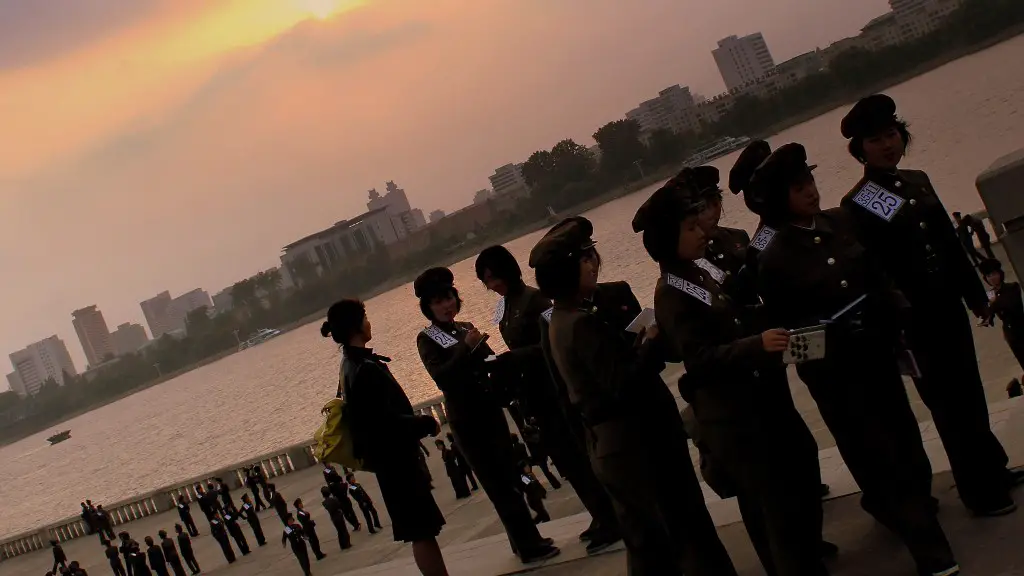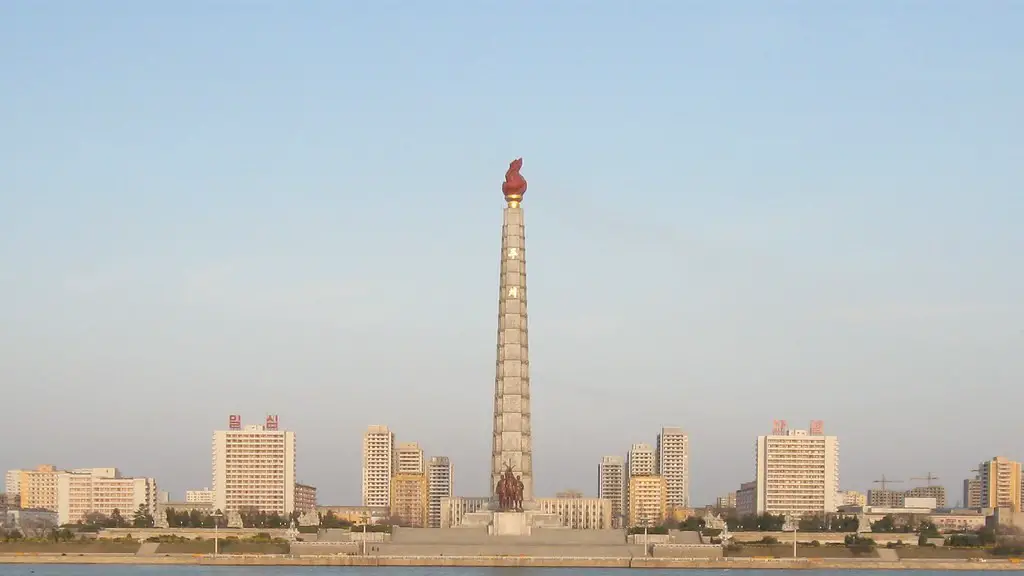North Korea and South Korea have been divided since 1945. Prior to this, the Korean peninsula was a unified, independent nation. The post-World War II occupation of Korea by the United States and the Soviet Union set the stage for decades of animosity between North and South Korea. This divide eventually evolved into one of the most dangerous of all international conflicts. The Korean War was one of the most catastrophic and deadly conflicts of the 20th century, and it is crucial to understand the background of this stalemate.
In 1945, Japan lost control of mainland Korea, which had been a part of its empire since 1910. Subsequently, the Korean peninsula was separated along the 38th parallel, at which point the Soviet Union took control of the North and the United States occupied the South. Shortly afterwards, the U.S. moved to create a new government for South Korea, installing Syngman Rhee as its first president. This formalized the separation of North and South Korea.
In 1950, North Korea decided to take advantage of the weakened state of the South and invade. This sparked a conflict that lasted three years and cost the lives of millions of Koreans and an estimated 55,000 American troops. Yet, when an armistice was reached in 1953, the demarcation between the two countries remained the same. To this day, North and South Korea remain technically at war, as no peace treaty has ever been signed.
The ongoing tensions between North and South Korea have been further exacerbated by the leadership of the North Korean government. Under the rule of Kim Jong-Un and his father, Kim Jong-Il, the North Korean government has adopted an increasingly authoritarian and insular approach. This has included the use of brutal tactics against political opponents, the imprisonment of dissidents, and frequent military provocations against their southern neighbor.
Despite this, South Korea remains committed to peace with North Korea and has sought to improve relations through direct dialogue and engagement. North Korea has responded by periodically engaging with South Korea and the international community, including a summit between the leaders of North and South Korea in 2018. Despite these positive steps, the two countries remain divided by a heavily armed border and are watched over by a fragile peace.
Economic and Cultural Differences between South and North Korea
The divide between North and South Korea is felt in many ways, not least of which are their distinct economic and cultural differences. The South has become one of the world’s most advanced economies, while the North has remained trapped in a state of economic stagnation and has been subject to a number of sanctions for its nuclear activities. South Korea has embraced modernity, while the North is deeply opposed to it. South Korea has developed a vibrant and open society, while the North is heavily censored and socially austere. Moreover, the two countries have markedly different approaches to foreign policy, with the South firmly entrenched in the Western world and the North refusing to recognize its power.
The contrasts in their respective political systems are just as striking. South Korea has a democratically elected government, while North Korea follows the principles of a one-party rule. Despite the presence of a powerful military, South Koreans enjoy a relative amount of freedom of expression and have seen the emergence of a stable, if sometimes fractious, democracy. North Koreans on the other hand, have little to no freedom, and the government has been accused of extreme human rights abuses. This great divide has been entrenched over decades and shows no sign of abating any time soon.
Challenges to Reunification of Korea
The idea of reunification is an ever-present issue in South Korean politics and society. It is seen as a way to achieve long-term peace in the region, as well as to alleviate the economic, political and psychological toll that the separation of the country has had on its people. While tensions may be relatively low at present, and the nuclear weapons of North Korea are no longer viewed as an immediate threat, the underlying political and ideological divisions between the two countries remain deep and entrenched.
The most significant challenge to the reunification of Korea is its economic disparity. North Korea’s economy is in such a dire state that it would be almost impossible for it to catch up to the South in the near future. It would require a massive investment to modernize North Korea’s infrastructure, industries, and educational systems. This would also require a complete overhaul of its authoritarian and closed political system, a prospect that is unlikely to happen anytime soon. In addition, there is the issue of cultural differences between the two countries, which have become more entrenched over time.
The ultimate goal of reunification seems to be a distant one at the moment, as repeating cycles of military provocations, sanctions, and negotiations between North and South Korea have defined the relationship between the two states. Nonetheless, the South Korean government continues to keep the possibility of reunification open, with South Korean President Moon Jae-in outlining a plan for gradual economic integration and eventual political unification.
International Perspectives on the Separation of North and South Korea
The divide between North and South Korea remains a major concern for the international community, particularly in terms of security. The United States has kept a close eye on the Korean peninsula since the end of the Korean War, with American troops stationed on South Korean soil to serve as a deterrent against any potential aggression from the North. China, too, has a major stake in the issue of Korean reunification, as it is North Korea’s only major ally, while South Korea shares strong ties with America and many other countries.
The United Nations has also attempted to mediate between North and South Korea in the past, most recently in 2018. In an effort to ease tensions between the two states, the UN has organized talks and dialogues, as well as humanitarian aid programs and initiatives. Despite these diplomatic efforts, the underlying hostilities between North and South Korea remain, and it is difficult to predict when they will ultimately be resolved.
Effects of Division on People of Korea
The separation of North and South Korea has had serious psychological effects on its people, as many Koreans are still haunted by memories of war and displacement. This is especially true for the older generations, many of whom were affected by the Korean War and had to flee the North or the South. The younger Koreans, although not as directly affected by the conflict, have also been shaped by its legacy and have grown up in a divided society.
The reunification of Korea remains a distant dream for many, and the idea of a unified Korea has become increasingly abstract to younger generations. This long-term political standoff has had a major psychological impact on Koreans, creating feelings of alienation, insecurity, and powerlessness. In this sense, the division of North and South Korea does not only represent a political problem, but also a deep psychological wound that will likely remain for many generations to come.
Future Possibilities for Unification
Despite the deep separation of North and South Korea, many still believe that reunification is possible in the future. This prospect remains a matter of conjecture, however, and any attempt at reunification would have to take account of the numerous challenges, both political and economic, that stand in the way of a unified Korea.
For North and South Korea to reunify, it will require a major shift in the political will of one or both sides. Above all, if any successful reunification is to take place, it will require a commitment to peace, dialogue, and compromise on all sides. Unfortunately, such a commitment has yet to be displayed in any tangible form. Until then, the possibility of reunification will remain a distant dream for millions of Koreans on the both sides of the demarcation line.
Impact of Technology on Unification
In recent years, technology has emerged as one of the most prominent tools for connecting people and bridging the gap between North and South Korea. Communication technologies such as mobile phones, the internet, and social media have been instrumental in allowing people to bypass political borders. This has enabled Koreans on both sides of the border to interact, share information, and even view each others’ lifestyles, which in turn has had a major impact on perceptions of the other.
As technology continues to develop, it may provide further opportunities for connecting North and South Korea. In the future, it could help to bring the two Koreas closer together, enabling people to better understand each other and eventually leading to a breakthrough in negotiations between the two sides.
Significance of Potential Unification
The potential reunification of North and South Korea could be one of the most significant political changes of the 21st century. A unified Korea could effect a ripple of change across the whole of East Asia, transforming the balance of power in the region and providing much-needed economic stability. It could also serve as a lasting security guarantee for the region and the world at large.
The unification of Korea would also not just be of geopolitical significance, but would also symbolize a major psychological shift in how Koreans view themselves as a people. It could provide the opportunity for Koreans to rediscover a shared culture and identity, reinvigorating a feeling of unity and closer bond that has been lost for many decades.
The reunification of Korea may or may not happen in the near future, but it remains one of the most important and far-reaching issues of our time. No matter what, it is essential to understand the history of this divide, the potential impact of reunification, and what it would mean for the future of the region.





